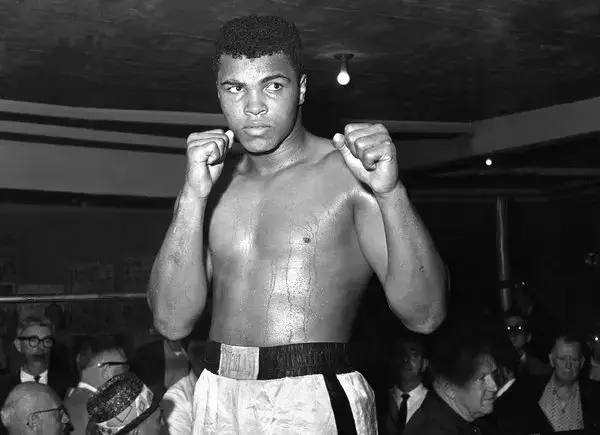Muhammad Ali (1942)

Muhammad Ali
Introduction: Muhammad Ali, born as Cassius Marcellus Clay Jr. on January 17, 1942, in Louisville, Kentucky, was one of the greatest professional boxers in history and a cultural icon.
Early Life and Boxing Beginnings: Ali's boxing journey began at the age of 12 when he started training at a local gym to learn how to defend himself. He quickly showed immense talent and won numerous amateur championships.
Olympic Gold Medal: In 1960, Ali represented the United States at the Rome Olympics, where he won the gold medal in the light heavyweight division. This victory marked the start of his legendary boxing career.
Professional Boxing Career: After turning professional, Muhammad Ali quickly rose through the ranks and earned a reputation for his dazzling footwork, lightning-fast jabs, and unorthodox fighting style. He became known for his outspokenness and charismatic personality, earning the nickname "The Louisville Lip."
World Heavyweight Champion: In 1964, at the age of 22, Ali won the world heavyweight title by defeating Sonny Liston in a stunning upset. He defended his title multiple times, engaging in iconic fights against rivals such as Joe Frazier, George Foreman, and Ken Norton.
Conscientious Objector and Suspension: Ali's refusal to be drafted into the U.S. military during the Vietnam War due to his religious beliefs as a Muslim led to his suspension from boxing and the stripping of his heavyweight title. He stood firm in his convictions, sacrificing the prime years of his career for his principles.
Comeback and Legacy: After a three-year hiatus, Ali returned to the ring and reclaimed the heavyweight title. He continued to fight against top contenders and became the first three-time world heavyweight champion in history.
The Thrilla in Manila and Rivalries: One of Ali's most legendary fights was "The Thrilla in Manila" against Joe Frazier in 1975. The bout is considered one of the greatest matches in boxing history. Ali's rivalries with Frazier and George Foreman captivated the world and solidified his status as a global sports icon.
Ali's Impact Beyond Boxing: Outside of the ring, Muhammad Ali was a civil rights activist and an influential figure in the fight for racial equality. His charisma, wit, and unwavering confidence transcended sports and made him a symbol of hope and inspiration for millions.
Later Life and Legacy: Ali retired from boxing in 1981 with a professional record of 56 wins, 5 losses, and 37 knockouts. He remained active in philanthropy and humanitarian work, promoting peace, religious tolerance, and humanitarian causes.
Passing and Global Mourning: Muhammad Ali passed away on June 3, 2016, at the age of 74, after battling Parkinson's disease for several years. His death sparked an outpouring of grief and tributes from people around the world, highlighting his profound impact on society.
Conclusion: Muhammad Ali's legacy extends far beyond his achievements in the boxing ring. He was a trailblazer, an advocate for civil rights, and a symbol of courage and conviction. His influence on sports, culture, and social justice continues to inspire people worldwide, making him a true legend in the annals of history.
